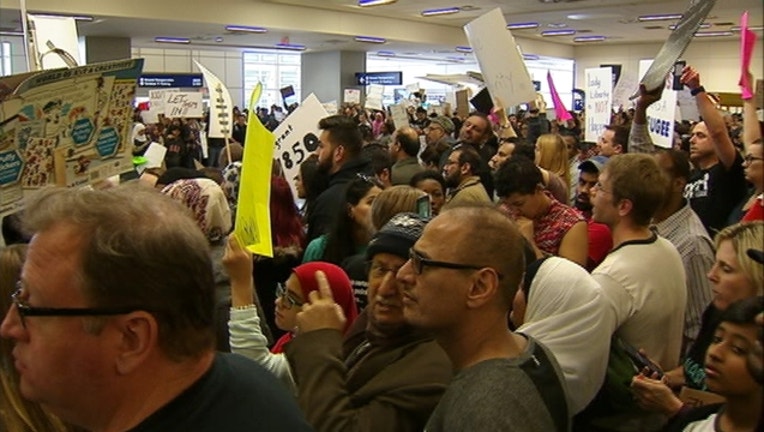Trump ban creates chaos for travelers in, out of the country

LOS ANGELES (AP) - From Dubai to Los Angeles, President Donald Trump's order barring travelers from seven Muslim countries from entering the U.S. has thrown the lives of thousands into limbo.
Middle Eastern scholars studying in the U.S., foreigners planning to visit loved ones living in this country, and others who happened to be outside the United States when the order was issued last week are struggling to find a way in.
Also, some legal U.S. residents and visitors from the affected nations are afraid to leave this country for business or family reasons, afraid they won't be allowed back in.
Meanwhile, attorneys and federal judges worked to clear a path for some of those who were turned away.
One was Sahar Algonaimi, a Syrian-born schoolteacher from Saudi Arabia, who arrived at Chicago's O'Hare Airport on Saturday on her way to Indiana to care for her elderly, cancer-stricken mother.
Although she had a visa and had visited the U.S. numerous times before, the 58-year-old woman was put on a plane back to Saudi Arabia after authorities persuaded her to give up her visa. An hour after she left, a judge blocked Trump's order, an act her family's attorney said would have allowed her to stay.
"Now, unless we can get the government to give her humanitarian parole, she will have to apply for a new visa," Kalman Resnick said Monday. "This is just one of many stories from the weekend at O'Hare and all around the country."
In Dubai, Nazanin Zinouri of South Carolina said she was barred from boarding a flight home over the weekend after traveling to Iran to visit her mother and other family members.
A legal resident of the U.S. since 2010, she has earned master's and doctorate degrees in this country and works for a technology company. She fears she will lose her job, home, car and pet if she can't return soon.
"What's going to happen to my dog? My dog is sick. Is anyone going to adopt him?" she asked. "Am I going to lose my job forever?"
On Sunday, Homeland Security Secretary John Kelly said green card holders, or legal permanent U.S. residents, will be allowed to re-enter the country unless there is information indicating the person is serious threat.
Trump on Monday denied his order was to blame for chaos at the nation's airports over the weekend, instead pointing to computer glitches and protesters. He took to Twitter to argue that swift action on immigrants was important, saying there are a "lot of bad 'dudes' out there."
The president issued a 90-day ban on travelers from Iraq, Syria, Iran, Sudan, Libya, Somalia and Yemen. He also suspended the admission of all refugees for 120 days and indefinitely barred the processing of refugees from Syria.
Among those kept out of the country was a California man's 12-year-old daughter, who was born in Yemen.
Ahmed Ali, a 38-year-old manager of a market in Los Banos, said he had been trying to get a visa for his daughter Eman for five years, and she was finally issued one last Thursday. He had planned to take her to the U.S. on Saturday, but she was barred from boarding a flight in the African country of Djibouti.
"It is racist," he said of the executive order. "We are being targeted for our nationality and religion."
Ali, his wife and their two older children are U.S. citizens.
Also barred from returning is Khaled Almilaji, a Syrian doctor who has been attending Brown University on a scholarship while he studies ways to rebuild his country's health system. He said that his pregnant wife remains in the United States.
"It is really sad where the world is going to," said Almilaji, who risked his life to provide medical care during Syria's civil war and coordinated a campaign that vaccinated 1.4 million Syrian children.
In New York, Somali-born freelance journalist Ismail Einashe, who holds British citizenship, is debating whether it is safe to leave the U.S. to take care of business in London.
He said British officials gave assurances that returning won't be a problem for someone like him who holds a British passport and a 10-year multiple-entry visa. But he's not sure he believes them.
"Clearly there's a lot of confusion here in the U.S.," he said. "I'm afraid if I leave the city, I may not be able to enter the country again. I think I have good reason not to feel confident."
Einashe, 31, arrived in New York earlier this month on a fellowship and is taking part in a graduate seminar at the Dart Center for Journalism and Trauma at Columbia University.
___
Associated Press Writers Deepti Hajela in New York; Amanda Lee Myers in Los Angeles; Jennifer McDermott in Providence, Rhode Island; and Martha Waggoner in Raleigh, North Carolina, contributed to this story.

